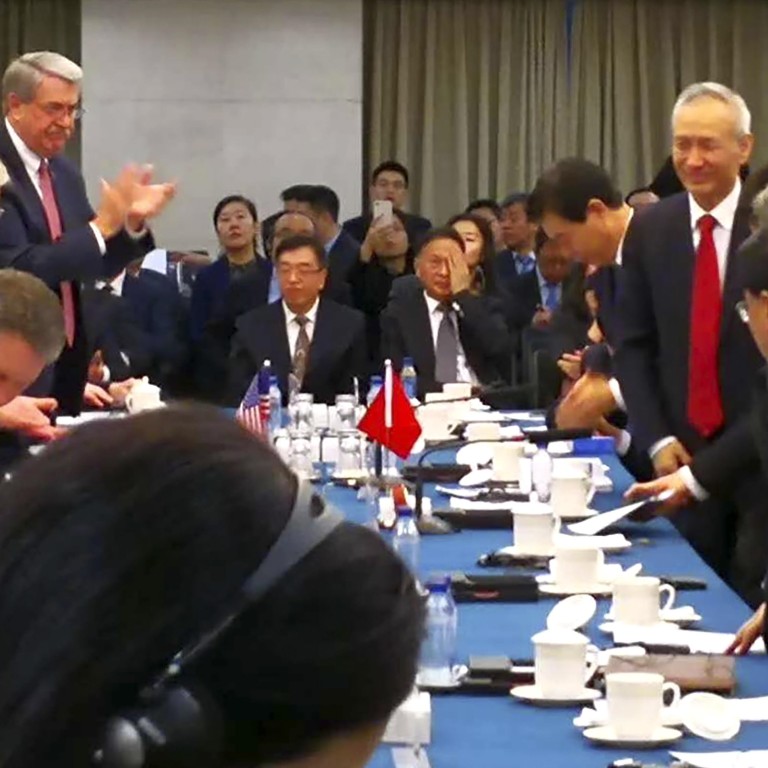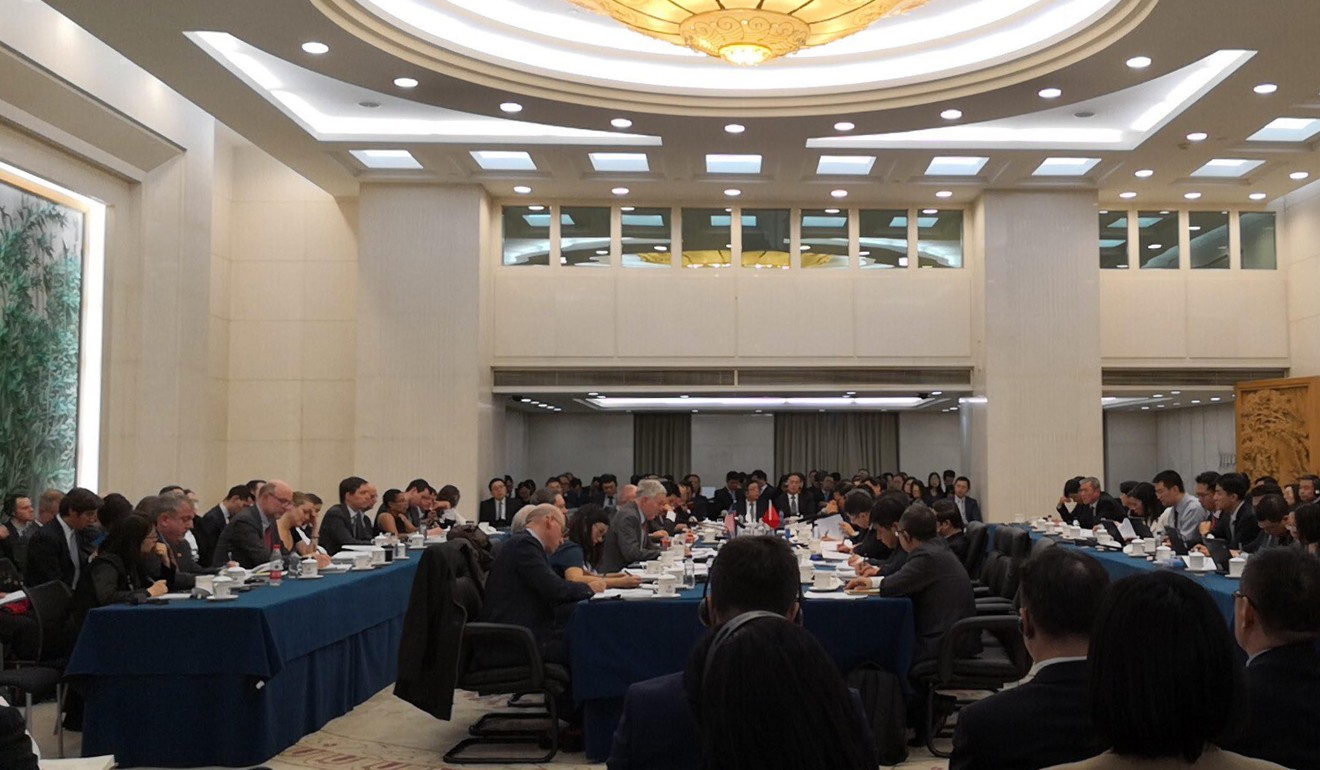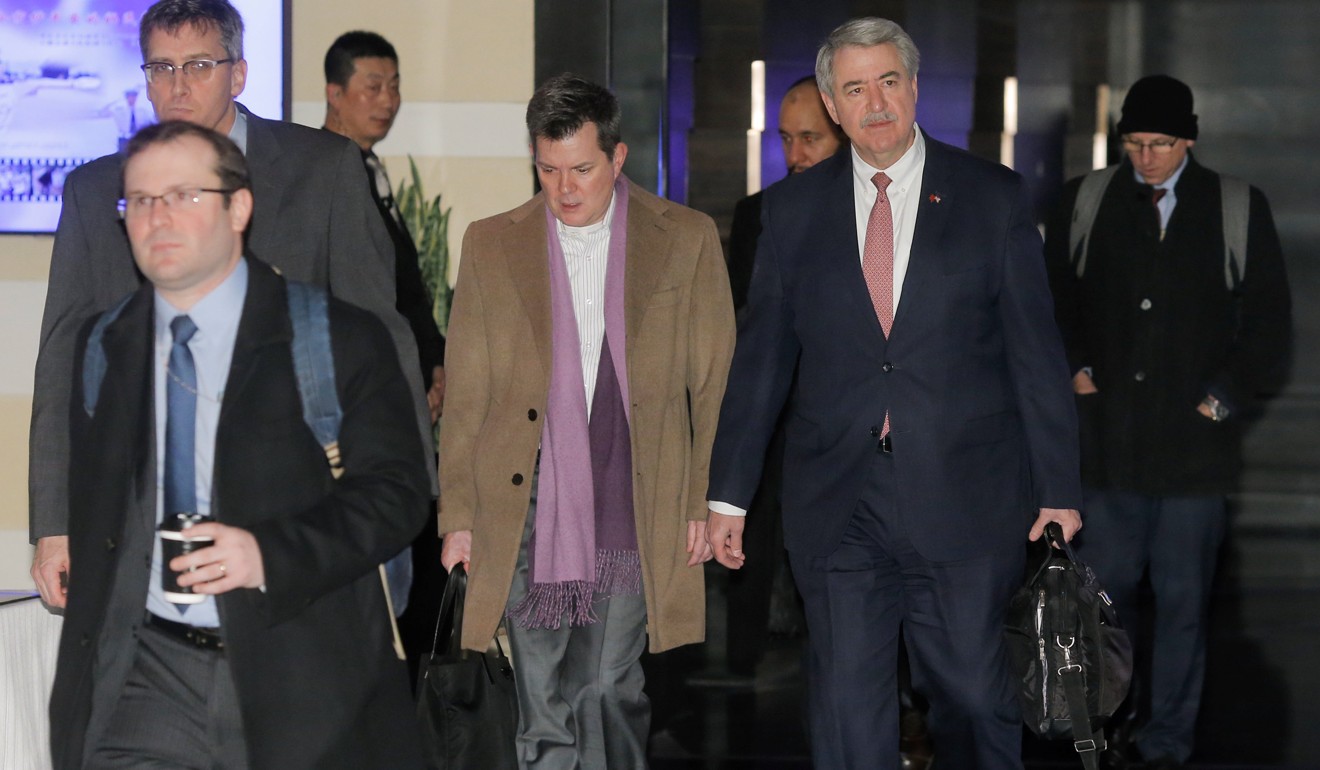
Chinese VP Liu He makes surprise appearance on first day of China-US trade talks, despite absence of America’s heavy hitters
- Leaked photos show vice-premier meeting US delegates, along with large Chinese delegation
- Analysts say China is showing goodwill and commitment to reaching a deal
China and the United States began a fresh round of trade talks on Monday with a surprise appearance from Vice-Premier Liu He, according to pictures leaked from the venue inside the Ministry of Commerce in Beijing.
Liu – top economic aide to President Xi Jinping and the man in charge of Beijing’s trade talks with Washington – had not been expected to attend the negotiations, which were officially at the “vice-ministerial” level.
The US delegation is being led by Deputy US Trade Representative Jeffrey Gerrish, a long-time ally of US Trade Representative Robert Lighthizer.
In one of the photos being circulated online that has been confirmed by sources, Liu is seen standing among a group of Chinese officials including Commerce Minister Zhong Shan and Vice-Commerce Minister Wang Shouwen.
Both Zhong and Wang were at the table when Xi and US President Donald Trump agreed to a three-month trade war truce in Argentina on December 1. The photo shows US officials, including Gerrish, on the other side of the table, clapping their hands.

A second leaked picture provides a wider view, showing at least 100 Chinese officials seated in the room – a delegation twice as large as the US team.
There are far more officials involved in the talks, which are due to end on Tuesday, than in previous rounds of trade negotiations in Beijing and Washington last year.
According to a report by Bloomberg, the talks are being conducted in different groups on the areas of non-tariff measures, intellectual property, agriculture and industrial purchases.
Chinese foreign ministry spokesman Lu Kang did not provide any update on the progress of the talks during a regular press briefing on Monday afternoon. But he did say that the trade war was bad for both China and the US, as well as the world, and that Beijing had “the sincerity to resolve bilateral trade disputes with the US based on mutual respect”.
China, US will ‘come up with something’ to defuse trade war, Hong Kong scholar predicts
Chinese analysts said Liu’s attendance at the talks showed goodwill and Beijing’s commitment to reaching a deal with Washington.
“With China’s economy facing downward pressure, especially as it braces for the trade war impact, the Chinese side has had more incentives – and some of the US demands are also in line with Beijing’s own needs for economic reform,” said Shi Yinhong, director of the Centre on American Studies at Renmin University of China.
“Since the US has made it clear that they don’t want empty promises, there will be more detailed discussions this time.”
He Weiwen, a senior fellow at Beijing-based think tank the Centre for China and Globalisation, said China was now willing to go the extra mile to meet US demands after it honoured earlier pledges to buy more US energy and agricultural products.
“The US side will surely raise issues like forced technology transfers and competitive neutrality … and the Chinese side will be willing to discuss the issues of intellectual property protection, forced technology transfers and subsidies,” He said.
US Secretary of State Mike Pompeo struck an optimistic tone about the bilateral trade war on Monday.
“We're making progress” on trade, Pompeo said in an interview with CNBC. “I hope too that we'll make progress on all of the other places where China's not behaving in the way we wish it would. Whether that's their cyber activity, that has had a real impact.
“Whether that's the theft of intellectual property, which has hurt American businesses. All of these things. And trade on top of it are part of what U.S. diplomats are confronted with each day.”
At the same time, He said Beijing would try to discuss these issues within the World Trade Organisation framework instead of “the 301 report or US domestic law”.
Trump set to hold talks with China’s Wang Qishan in Davos
The US delegation also includes Gregg Doud, USTR chief agricultural negotiator, Ted McKinney, undersecretary for trade and foreign agricultural affairs at the Department of Agriculture, and David Malpass, under secretary of the Treasury for International Affairs.
The other two names highlighted by the US side are Gilbert B. Kaplan, undersecretary of commerce for international trade at the Department of Commerce, and Steven Winberg, assistant secretary for fossil energy at the Department of Energy. None of the six senior members in the US delegation were at the table when Trump and Xi met in Buenos Aires on the sidelines of the G20 last month.
During the trade war ceasefire they agreed, the two sides have to meet a deadline of March 1 to reach a deal. Otherwise, the US side may raise its 10 per cent tariffs on US$200 billion of Chinese goods to 25 per cent.
“We’re monitoring the [negotiations in Beijing] closely and are encouraged that dialogue remains open,” Christin Fernandez, a spokeswoman for the Retail Industry Leaders Association, said in an emailed response to questions.
“America’s retail ecosystem is vast and our companies have spent years developing supply chains throughout China. Our main priority is ensuring trade relations continue to be productive to the benefit of US retailers, consumers, and the millions of American jobs supported by trade.”
Markets in Asia rose on Monday over expectations that the meeting would help tackle a host of thorny issues at the heart of their trade dispute.
The Hang Seng Index in Hong Kong rose 0.82 per cent, while the Shanghai and Shenzhen exchanges were up 0.72 per cent and 1.71 per cent, respectively.
‘It could go either way’: China and US ready for trade war talks in Beijing
Trump said on Sunday that trade talks were going very well and that weakness in the Chinese economy gave Beijing a reason to work towards a deal.
“I think China wants to get it resolved. Their economy’s not doing well,” Trump told reporters at the White House. “I think that gives them a great incentive to negotiate.”

China has appeared to take steps since the December Xi-Trump meeting to address trade tensions, including resuming imports of US soybeans and rolling back further tariffs on US car imports.
Its legislature has also introduced draft legislation to protect intellectual property rights for foreign investors and it has continued to play down the “Made in China 2025” industrial policy – an initiative at the heart of US concerns about how China could supersede it in tech supremacy.
But observers fear the time constraints and substantial range of prickly issues, including those Beijing considers core to its development, will make it difficult to reach a deal.
Additional reporting by Owen Churchill in Washington.


